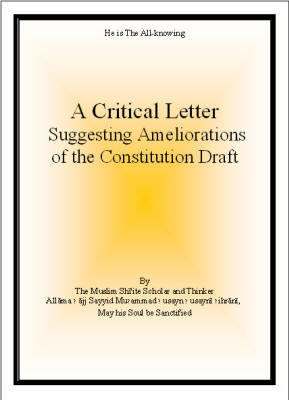
Separation of forces is wrong;
All forces are to be relegated to the most wisely aware and the most proximate people to God.
Subject of the Letter : Amelioration of the Constitution Draft
In this letter the following questions are dealt with:
■ What is the framework of power like in an Islamic government?
■ Is it right to institute presidency while there is leadership?
■ Is it logical to seek public opinion in decision-makings?
■ Is the parliament’s duty legislation or consultation and expertizing?
After the publication of the Constitution Draft at the outset of the Islamic Revolution and proposal of the late leader of the Revolution, may his soul be sanctified, to scholars and thinkers to comment on this draft, Allama Ṭihrānī, may his soul be sanctified, sent a detailed letter of criticism and analysis to the Founder of the Islamic Republic, the Assembly of Experts, and scholars of various cities.
Excerpts from the letter (Articles from the Islamic Constitution):
• Islamic philosophy is Monotheistic; and the law originates from the World of Universality and Detachment which lie in the heart of the friend of God.
• The structure of Islamic Government is not based on the majority’s opinion; rather, it is based on cognition by the experts.
• The experience of Constitution Movement suffices us.
• The highest authority in Islamic Government is allowed for the jurist; and other centers of power such as presidency, legislation assembly, and judiciary are to be established to execute the commands of the ruling jurist (walīyy-i faqīh).
• The Islamic constitution is the Qur’an and Sunna; and compilation of any type of law by this name has to function as explanatory.
• Consultative assembly functions as providing the leader with expertise and consultation rather than as legislating.
• Setting up an Islamic Government has been intended for execution of Islamic rulings; and it is a Monotheistic system of government based on prayer, alms tax, Ḥajj pilgrimage, Jihād, and wilāyat.
• The curricula and the educational procedures in the schools are to be planned according to Islamic thought.
• Family is the basic unit of the society and its management is entrusted to man.
• Setting up parties and unions and the establishments relating to formal religions are free on the condition that they do not violate the principles of the Islamic Government.
• The ruler and the judge ought to be from among men.
Persian & Arabic full text